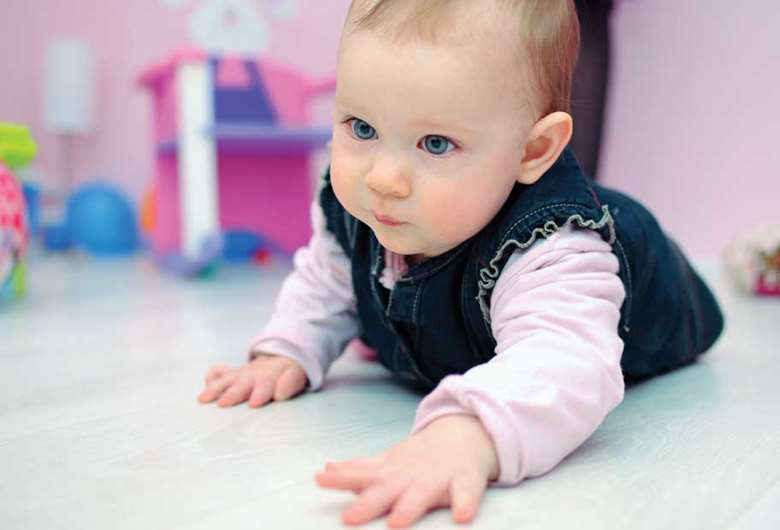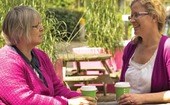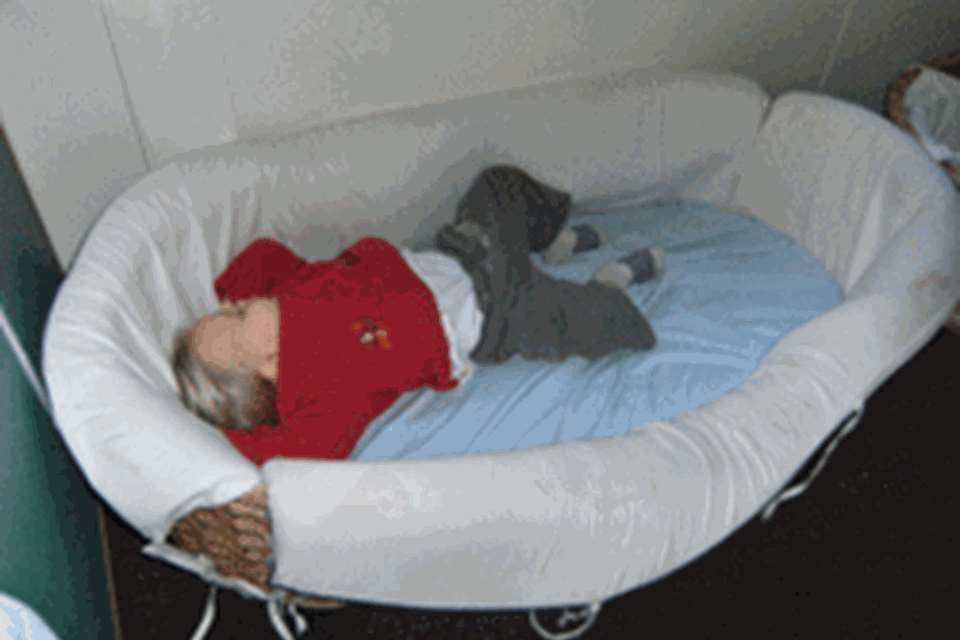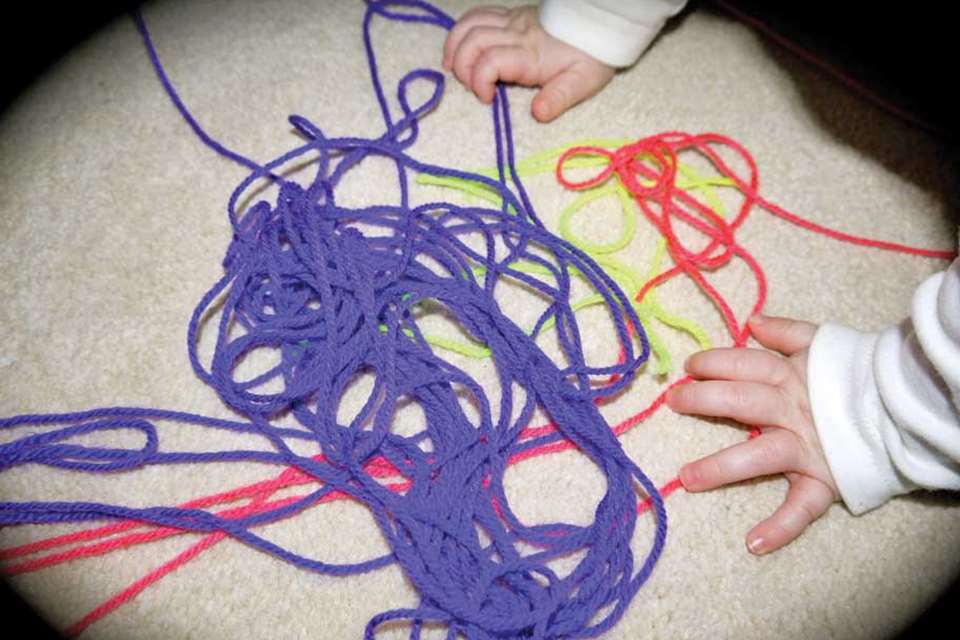Learning & Development: Baby room project - Take five
Dr Sarah Christie
Monday, June 16, 2014
The Baby Room Project has succeeded in directing some much-needed attention to the care of the youngest children. Dr Sarah Christie talks to its founders Professor Sacha Powell and Dr Kathy Goouch.

Five years ago, Professor Sacha Powell and Dr Kathy Goouch of Canterbury Christ Church University became aware of an aspect of daycare that appeared to have been overlooked: there was little or no research about what was happening in baby rooms or why.
The resulting research and development work, articles, book and four Annual Baby Room Conferences have begun to direct attention to baby room practice.
Here, Sacha and Kathy talk about the development, impact and future of the The Baby Room Project.
Sarah Christie: Kathy and Sacha, can you tell me how The Baby Room Project was conceived?
Sacha Powell Our work on the review of literature for the birth to three framework really taught us that we didn't know very much about baby room practice. The few examples of baby care that we'd seen for ourselves were troubling for a number of reasons. I think we felt anxious and wanted to know more and to help. We applied to the Esmee Fairbairn Foundation and we encountered people there who recognised the importance of the work, and that was the start.
Kathy Goouch I think it's important to say why we were worried - we were troubled by many things: by the fact that baby rooms were frequently in cramped conditions and often the outdoor space hadn't been thought about, but particularly by the fact that no one seemed to be really alert to or informed about baby room practice. So it was the whole provision - the environment, resources, professional status and training and support.
In fact, it was only when we really started the development aspect of the project itself, listening to those individuals who worked in the baby rooms, that we realised what an unenviable position they were in. At this point the focus of the project became clear; professional development assumed huge importance along with the well-being of people employed to care for babies.
SC So how did the project take shape?
SP We invited a small group of practitioners to attend development sessions at one of our university campuses. Between sessions we carried out research processes that fed back into the development sessions. We interviewed, made video observations and then designed bespoke sessions, ensuring we were responsive to the particular professional development needs of our project participants.
KG So although we had planned aspects of the work, the participants became co-constructors of the development itself because we worked with them, identifying issues they felt were important.
SP One of the most important aspects of the project was enabling participants who felt isolated in their baby rooms to form communication networks. We created a group on NING, a protected online social media platform, to provide another space for support and networking.
KG We should also say that we had the support of a fantastic Baby Room Project Expert Group, made up of special people with unique perspectives. We started with Tricia David, who is an expert in every sense, Janet Moyles, who has a really good eye on politics and policy, the brilliant Liz Attenborough, now retired from Talk to Your Baby at the National Literacy Trust, Liz Roberts at Nursery World for her wide-angled perspective on the early years field, research, policy and practice, and later on we had the privilege of working with Peter Elfer, Jools Page, Helen Moylett, Jo Baranek and Laura Barber. This fantastic group both supported us and challenged our thinking.
SP When we got to the end of that first phase, we just felt we'd only begun to scratch the surface. The Esmee Fairbairn Foundation provided additional funding so we expanded the project to include new groups and local authority advisors. This group of advisors helped us to explore some of the issues surrounding baby room practice and also helped to disseminate more widely how baby room practitioners felt - that they were undervalued and lacked support.
KG The outcome of this was surprising. At the end of their phase of the project, the advisors and their managers talked about the way that their team discussions had radically changed as a result of the project.
Previously, they felt themselves to be in a regulatory, generally judgemental, role and the project required them to use another lens, to look differently at practice, as researchers.
SC What are the key legacies of the project?
SP I think the biggest legacy has to be that babies are talked about more now; they're acknowledged and they don't become invisible in a group called 'young children'. A really significant finding from our project work has been the importance of continuous professional development, focusing specifically on the work of this group of baby room people.
Our project participants have really taught us how much they valued these opportunities to learn - from each other, resources, networks and links, as well as anything we had to offer. The sadness, of course, is that these kinds of project opportunities are few and far between for most people who work in baby rooms.
KG Also, the project has taken the first steps in thinking about the significant status of baby room practice; I think we're really proud of that. Another legacy is that we've taken 'baby room' around the world and this project is now is part of conversations in China, Hong Kong ... SP ... Mexico, New Zealand, the US, Ireland and Scotland. We've been enormously privileged to have had the opportunity to have conversations with really esteemed colleagues.
KG These conversations and some of our experiences in other countries have led us to think about whether an international language of care exists that can cross geographical, cultural and language boundaries. We've been in touch with colleagues in Hong Kong, New Zealand and the US who are keen to join with us in such a project, so that's something that we're working on now.
 SC What's next for the project?
SC What's next for the project?
KG The Ragdoll Foundation is supporting us to work with practitioners to help them use singing in their care of babies. One of the findings from the project was that practitioners weren't finding it easy to talk to babies. We wondered whether singing might be another way to promote intimate engagements.
We're also working with The Froebel Trust to look at Froebelian notions of whether and how singing can be used purposefully to support relationships between babies' homes and nurseries and to pursue Froebel's own emphasis on the significance of singing in the care of babies.
SP Right now, we're preparing for our fifth, and probably last, conference. Annette Karmiloff-Smith will be a keynote speaker. Her authoritative voice on how babies begin to develop language will be really valuable.
KG Another keynote speaker is Travis Wright from the US, whose work is on a research methodology called Portraiture. He has the enviable attribute of making something that's hugely complex accessible to a really broad audience.
SP We know there is more to do to support work with babies in daycare, but watch this space for news about lullaby audits and the value of singing with babies!
Dr Sarah Christie (a senior research and knowledge exchange fellow), Dr Kathy Goouch and Professor Sacha Powell are based in the Research Centre for Children, Families and Communities at Canterbury Christ Church University
BABY ROOM CONFERENCE
Since 2010, the Annual Baby Room Conference has provided a unique space for people to come together to consider and discuss principles, policies and practice of babies' care, development and well-being.
Each conference offers insights from keynote speakers and a chance to network in a friendly environment with like-minded colleagues. The 5th Annual Baby Room Conference will be held at Coin Street Neighbourhood Centre (108 Stamford Street, South Bank, London SE1 9NH) on Tuesday 2 September, 9.30am-5.30pm (registration is from 9.30am-10.30am).
Online registration is now open at www.canterbury.ac.uk/rcfcfc under events.
The call for papers is now closed, but we welcome proposals for poster presentations.











